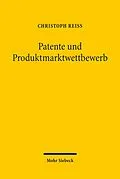Christoph Reiß considers the effects of strategic patents on competition in a number of game-theoretic models. He focuses on deterrence strategies and endogenous entry in asymmetric markets and on cumulative complementary patents, showing that strategic patents can - under certain conditions - have positive effects on welfare.
Patent and competition law are widely considered to be complementary branches of law aimed at protecting dynamic and static competition. Nevertheless, the boundary between both areas is still very controversial, as patents are increasingly being used as purely strategic instruments in static competition. If such patents are unavoidable due to the structure of real patent systems, Christoph Reiß suggests that these strategic patents must be analyzed as competition parameters on their own without any reference to the innovation protection aspect of patent law. He considers the effects of strategic patents on competition in a number of game-theoretic models. He focuses on deterrence strategies and endogenous entry in asymmetric markets and on cumulative complementary patents, showing that strategic patents can - under certain conditions - have positive effects on welfare. Thus, in a second-best world, from a normative perspective it is hardly sensible to aim purely at their elimination.
Autorentext
Geboren 1979; Studium der Volkswirtschaftslehre an der Universität Bayreuth; Wissenschaftlicher Mitarbeiter bzw. Lehrbeauftragter am Lehrstuhl für Wirtschaftstheorie an der Universität Bayreuth; Promotionsstipendiat der Hanns-Seidel-Stiftung; 2010 Promotion; seit Mai 2010 Konjunkturanalyst im Industrie-Sektor der Siemens AG (Nürnberg).
Patent and competition law are widely considered to be complementary branches of law aimed at protecting dynamic and static competition. Nevertheless, the boundary between both areas is still very controversial, as patents are increasingly being used as purely strategic instruments in static competition. If such patents are unavoidable due to the structure of real patent systems, Christoph Reiß suggests that these strategic patents must be analyzed as competition parameters on their own without any reference to the innovation protection aspect of patent law. He considers the effects of strategic patents on competition in a number of game-theoretic models. He focuses on deterrence strategies and endogenous entry in asymmetric markets and on cumulative complementary patents, showing that strategic patents can - under certain conditions - have positive effects on welfare. Thus, in a second-best world, from a normative perspective it is hardly sensible to aim purely at their elimination.
Autorentext
Geboren 1979; Studium der Volkswirtschaftslehre an der Universität Bayreuth; Wissenschaftlicher Mitarbeiter bzw. Lehrbeauftragter am Lehrstuhl für Wirtschaftstheorie an der Universität Bayreuth; Promotionsstipendiat der Hanns-Seidel-Stiftung; 2010 Promotion; seit Mai 2010 Konjunkturanalyst im Industrie-Sektor der Siemens AG (Nürnberg).
Titel
Patente und Produktmarktwettbewerb
Untertitel
Der strategische Einsatz von Patenten im Wettbewerb jenseits der Innovationsförderung - eine Untersuchung wettbewerbspolitisch relevanter Patentstrategien
Autor
EAN
9783161631238
Format
E-Book (pdf)
Hersteller
Genre
Veröffentlichung
01.12.2023
Digitaler Kopierschutz
Adobe-DRM
Unerwartete Verzögerung
Ups, ein Fehler ist aufgetreten. Bitte versuchen Sie es später noch einmal.
